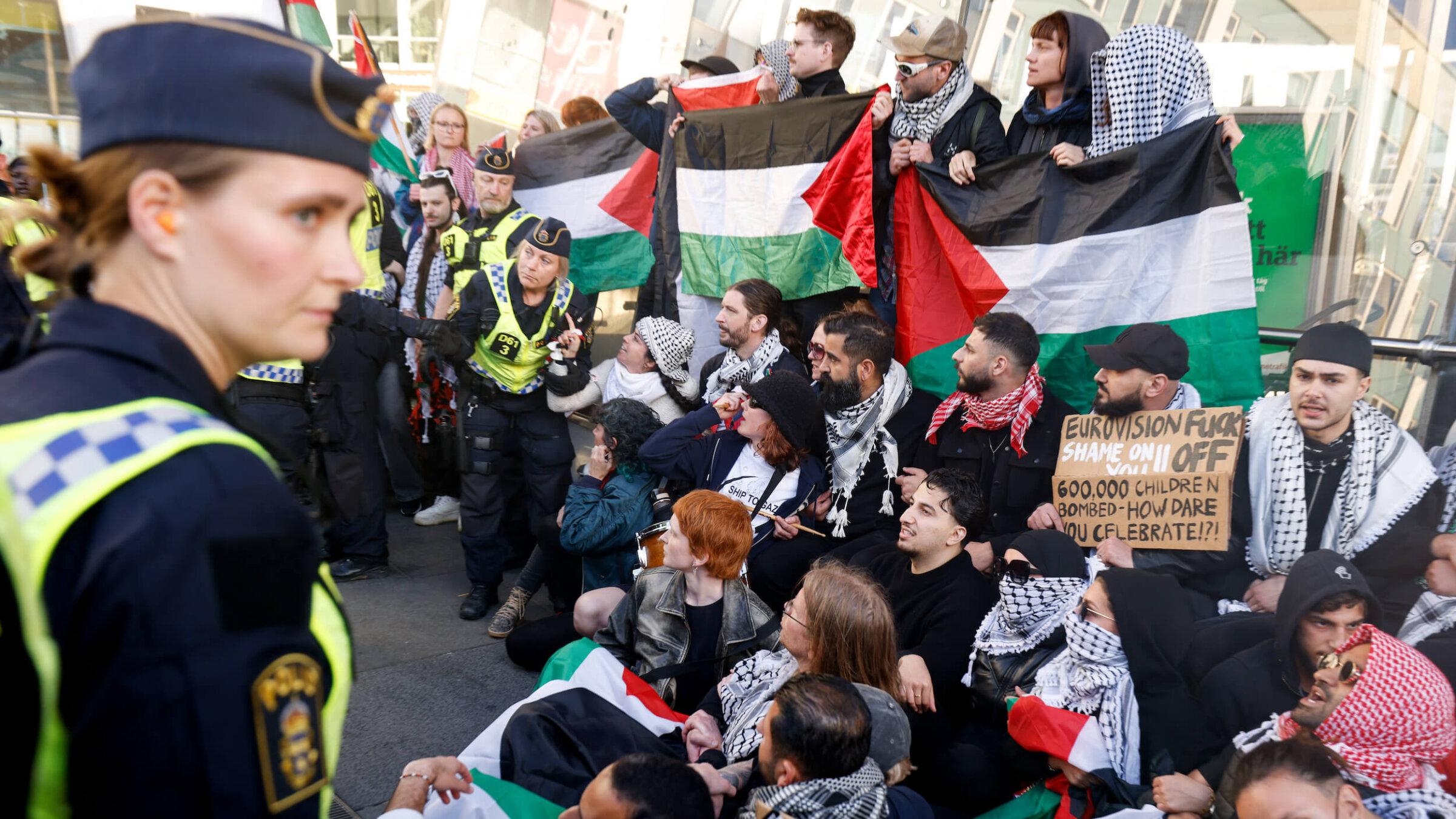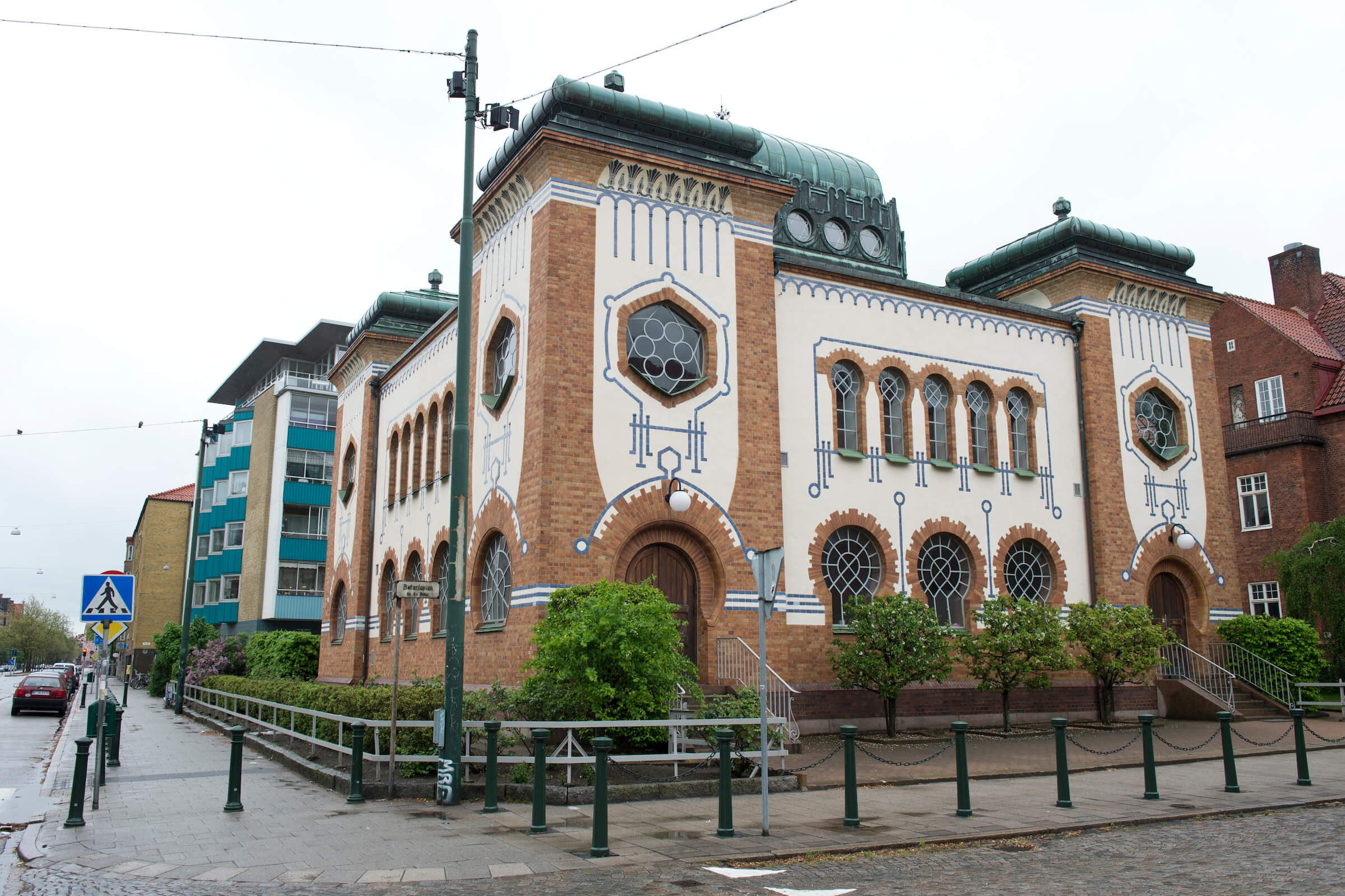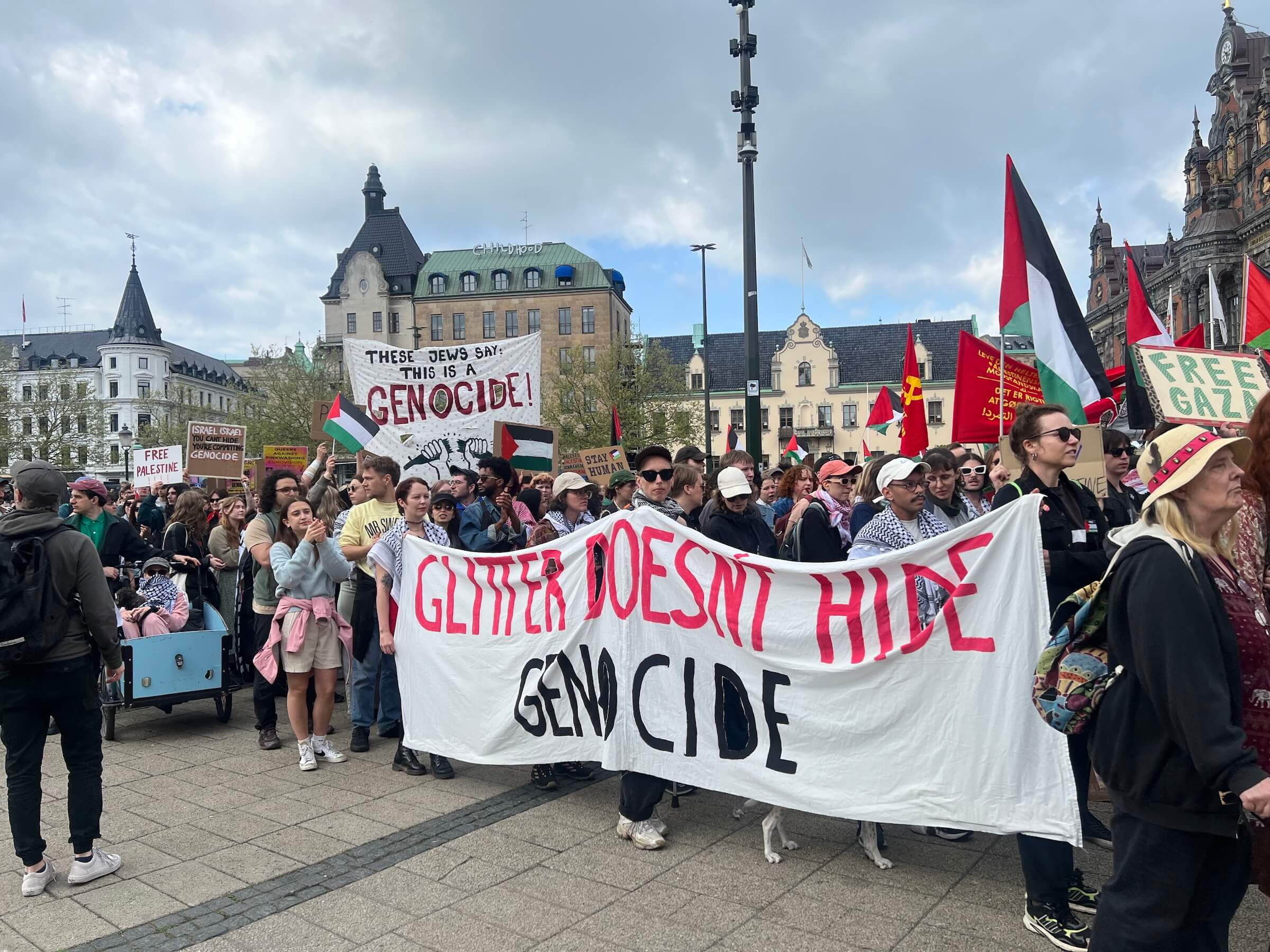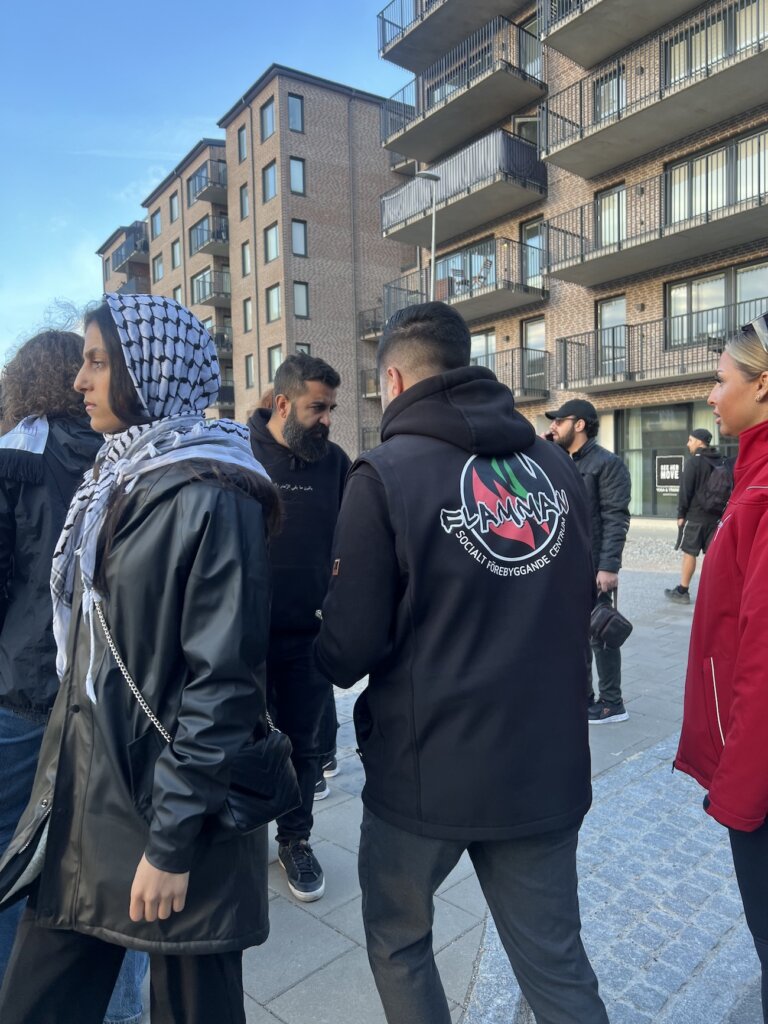How a utopian Eurovision became a microcosm of a world divided over Israel and Gaza
As crowds booed and cheered Israel’s contestant, Eden Golan, dreams of interfaith coexistence clashed sharply with a new reality

Pro-Palestinian demonstrators protested against Israel’s participation in the Grand Final of Eurovision 2024 outside Malmö Arena on Saturday. Photo by Andreas Hillergren/TT News Agency/AFP/Sweden OUT/Getty Images
MALMÖ, Sweden — As Israel’s Eden Golan finished her final performance at Eurovision on Saturday night, cameras cut to a single fan in the audience who was wearing a partially unzipped fox costume, both smiling and sobbing as he clutched an Israeli flag to his bare chest.
There were at least two Eurovision Song Contests this year. That fan, experiencing delirious joy alongside obvious heartbreak, represented both: the music bonanza, which for die-hard fans is both a shelter from real-world tensions and a mecca for ideals about what human connection can and should look like, and the agonizing global political fight over Israel’s participation, which in the contest’s final days appeared as though it might eclipse the entertainment altogether.
And behind it all was Malmö, a city of some 350,000 people that has for years struggled to combat a similar rift — between a utopian vision of coexistence and a reality in which identity-based divisions seem increasingly unresolvable — only for it to widen after Oct. 7.
“One of the most fascinating things about Eurovision is that there is so much going on there,” said Elad Carmel, an intellectual historian who was in Malmö for a conference about Eurovision at Malmö University. The song contest, Carmel said, is a ferment of intertwining and sometimes competing identities — personal, national, political — that has, since its 1956 debut, helped define what it means to be European. (Yes, even with non-European contestants, like Israel and Australia.)
“What happens,” he asked, “when these identities start to clash much more explicitly?”
An interfaith breakdown
After Oct. 7, a recent push to foster stronger relationships between Muslims and Jews in Malmö “fell apart,” said Rabbi Moshe David HaCohen, one of that effort’s organizers.
Sitting outside his favorite coffee shop near Triangeln, a central district where pro-Palestinian protesters maintained a vocal presence throughout Eurovision week, HaCohen joked about how unsafe he must seem, sitting there with his oat milk cappuccino, as a visibly Orthodox Jew.
In fact, HaCohen, who spent several years, beginning in 2017, as the rabbi for one of two local synagogues, has not felt unsafe in Malmö. When he met with representatives of the Simon Wiesenthal Center early in his tenure, he took them to task for the center’s criticism of the city, which it had called “reminiscent of Nazi Germany.”

“I said to them, the only thing you’re doing is disrupting the Jewish community’s future,” said HaCohen, who is no longer a rabbi in Malmö but remains involved in interfaith and Jewish initiatives around Europe, including the European Muslim Jewish Leadership Council. (HaCohen and his family have returned to Tekoa, the West Bank settlement where he studied under the rabbi and peace activist Menachem Froman.)
Malmö had, in the decades prior to HaCohen’s hiring, developed a reputation as a locus of Swedish antisemitism. It has seen several antisemitic attacks in recent years, including physical attacks against Jews during the 2009 Davis Cup riots. Islamophobia is also a significant problem; just before Eurovision kicked off, authorities granted permission for a public Quran burning, of which there have been several in recent years.
The city is home to a challengingly diverse set of extremist groups, said Rafi Farouq, 41, the operations manager of Flamman, a Malmö organization that works to combat extremism: “We have the far right, the Islamic religious extremism, and then we also have the far left.”
To hear older members of Malmö’s Jewish community talk, that wasn’t always the case.
Many say there was a time when the city felt like a haven for its Jewish community, most of whom are descended from Holocaust survivors, or are survivors themselves. When Fredrik Sieradzki, who was born in Malmö in 1964 and leads the local Jewish Learning Center, returned to the city in the early 2000s after spending two decades living elsewhere in Europe, he said, “one of the things that was prevalent was antisemitism, which wasn’t really a problem when I grew up.”
In addition to the attacks, Jewish children have faced widespread bullying in schools, he said.
“I have a 2-year-old girl,” said Ann Katina, 40, another local Jewish leader, whom I met along with Sieradzki at another Triangeln coffee shop. “I said to the mayor, when she starts to school, I don’t want her to go to school in Malmö.”
It seemed things might begin to improve after HaCohen, in 2017, joined with Imam Salahuddin Barakat to form what would become one of Sweden’s most visible interfaith initiatives, Amanah. The group bills itself as envisioning “a society which is based on trust,” in which diverse “religion and traditions” help “serve to strengthen the society.”
But after Hamas’ Oct. 7 attack on Israel, Barakat, who did not respond to an interview request, made several Facebook posts that members of the Jewish community found inflammatory, including one on Oct. 7 in which he wished peace to God’s “servants in Gaza.” (The post also mourned “all the innocents affected by the violence.”) Barakat, whom HaCohen said is “still a friend,” stepped back from Amanah, which HaCohen said is now in the process of reconfiguring after the onset of war “brought forth a lot of tensions that had been put down for a long time.”
To some local Jews, all the strife suggested that interfaith efforts to make Malmö a more hospitable place are doomed — as is the Jewish community.
“After I don’t know how many conferences,” said Leon Schatz, 74, “it is only worse.”
‘Love Love Peace Peace’
Eurovision and the interfaith efforts in Malmö could be seen to share a common goal: Create a space in which it becomes possible to transcend all that divides us, and work toward, instead, a shared culture. In 2016, contest hosts Petra Mede — who co-hosted again this year, with Malin Akerman — and Måns Zelmerlöw performed a song, “Love Love Peace Peace,” that earnestly spoofed the contest’s overriding themes. (A number of this year’s contestants ended their final performances with somewhat more pointed calls for a renewed commitment to that same philosophy.)
And as Eurovision came to Malmö, it became clear that the torments of the Israel-Hamas war had presented both contest and city with a common challenge: When you are striving toward a difficult ideal, said Elad Carmel, the scholar whose work touches on Eurovision, “what does it mean to try very hard to stick to it?”
For some in Malmö, it means preserving hope. Rafi Farouq, the anti-extremism worker, sees the fallout from Oct. 7, and its repercussions in Malmö, “destroying some of the work that we’ve been building,” he said. And yes, the tensions over Israel’s participation in Eurovision have made things worse.
“But I also think that the work that has been done so far has created a platform and a trust,” he said, that will help Malmö “overcome this again.”
Losing hope — and finding it
I followed outreach workers from Flamman, the organization Farouq helps to run, as they operated near Malmö Arena for Saturday’s Grand Final to help mediate between protesters demonstrating against Israel’s involvement in the competition and police. It was, by far, the tensest moment of the week, but still peaceful. The Flamman group was based at an outpost a couple hundred meters away from the arena, where riot police returned protesters who’d managed to get closer to the venue itself. They carried several with one officer to each limb; a woman who’d had one such encounter said it left her with bruises around her throat. Mounted police eventually corralled the demonstration, which had a few hundred participants, in a residential area, where one enraged man yelled at them that they were “fascists.”
Abid Haya, 29, the Flamman team leader, checked in with protesters who’d been removed from closer to the arena, and stepped in to de-escalate when an older man began shouting at a police officer. Haya was good humored through it all. During lulls, he told me about his one trip to New York City; we compared notes on our preferred halal carts.
Haya has lived in Malmö all his life, and has found that friendliness is one of the best tools in helping to make meaningful progress. “We work for the people,” he said. Flamman has a playbook for helping people avoid being sucked into violence: “We like to catch them, talk with them in a very friendly way, and try to understand them, so we have trust between us,” he said.

Earlier in the day, at a protest in Malmö’s center, Elias Rose Gordon, 23, who wore a kippah and was helping to hold a banner reading “These Jews Say: This is a Genocide,” told me that participating in protests against the war has given him a sense of Jewish connection around the city that he previously lacked. “I get most of my Jewish community from interactions with this network,” he said of the group he was marching with. “They’re the ones that tell me ‘Happy Shabbat.’”
“I can lose hope to be honest,” Farouq told me. But “one of the good things of working with young people is that you get hope all the time refilled.”
What it will mean for Eurovision to stick to its ideals is more nebulous.
The contest has long billed itself as apolitical, and for many fans, that sense of an arena in which they are free to become close to anyone, no matter where they’re from or what they believe, is one of the contest’s crucial draws. An Israeli fan who sang the praises of the competition’s neutral zone early in the week texted me that inside the arena, the final had been “terrible,” with loud boos “each time that Israel was mentioned.” In all his years of attending the contest, it was a new experience.
And yet each time Eden Golan was booed, a wave of applause rose, as if in combat. Both the cheers and jeers were nakedly political. How do fans “keep celebrating this” — the Eurovision culture they love — Carmel asked, “in a world of growing polarization and populism and wars?”
One possible answer: By putting less stock in the competition’s mission “to bring audiences and countries together.”
“Perhaps what we are seeing now is Eurovision is not trying to change the world anymore,” Carmel said, but rather to “at least keep our bubble.”
A fragile peace

Hours after I left Haya and his team, squeezing through a cordon as riot police cleared the last of the protesters who had managed to stay near the arena, I walked out of the Eurovision media center, a mammoth hall where hundreds of reporters were still listening to the end of a press conference with Nemo, Eurovision’s newly crowned winner. It was 2:15 a.m., and pitch dark, but birds were singing outside Malmö Arena.
The protests had continued until a little over an hour earlier, Haya had told me by text. As I walked from the Eurovision media center to the train station, there were few signs of the intense clashes that had dominated earlier in the night.
A group of inebriated British fans clustered onto the train after me, nursing their obviously bruised pride after their contestant, Olly Alexander, received zero points from the public for his song “Dizzy.” They began a loud and somewhat sloppy singalong, starting with the Backstreet Boys’ “I Want it That Way.”
(One of the Brits tried to start a round of “Hey Jude,” only to be met with silent judgment; drunk train karaoke has its firm, if inexplicable, rules.)
Across the aisle, a young man looked increasingly upset. It was so late. Everyone was exhausted. A woman he was sitting with was rolling her eyes. A few times, the man made subtle attempts at getting the singing group’s attention, to ask them to quiet down. It was clear that some of them noticed; it was clear they didn’t care.
Then something snapped. The man jumped up, started toward the group aggressively, and started yelling “shut the fuck up.” At the end of a week when the whole world appeared to expect violence in Malmö, it was the only time I saw a confrontation threaten to explode.
But it didn’t. One of the Brits, garbed in a kelly green three-piece suit with a matching train conductor cap embroidered with Nemo’s name, assured the man they would be off the train shortly; calm would soon be restored. There was a brief pause. And then, as if nothing had happened, the raucous, besequined, wound-licking group went right back to singing.

















